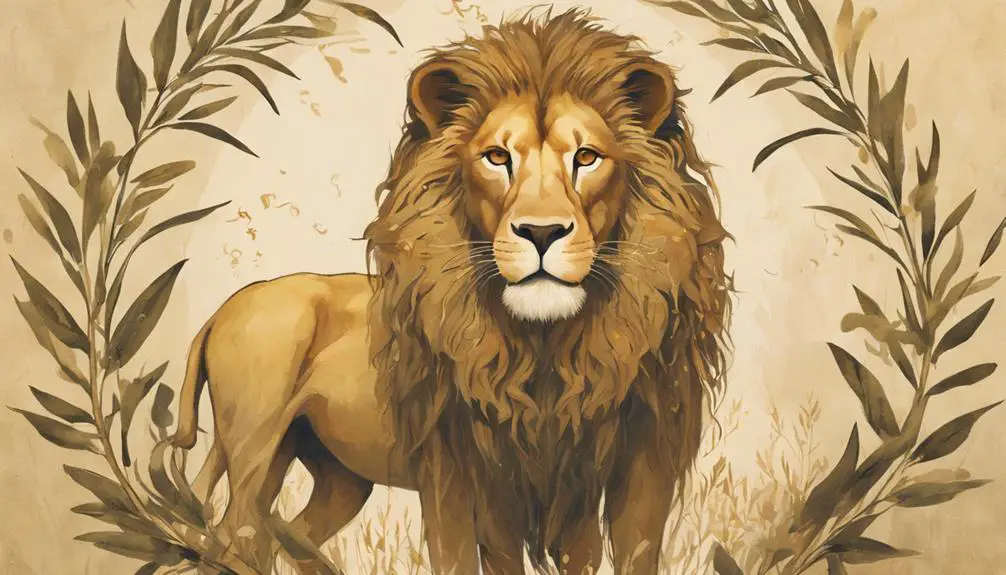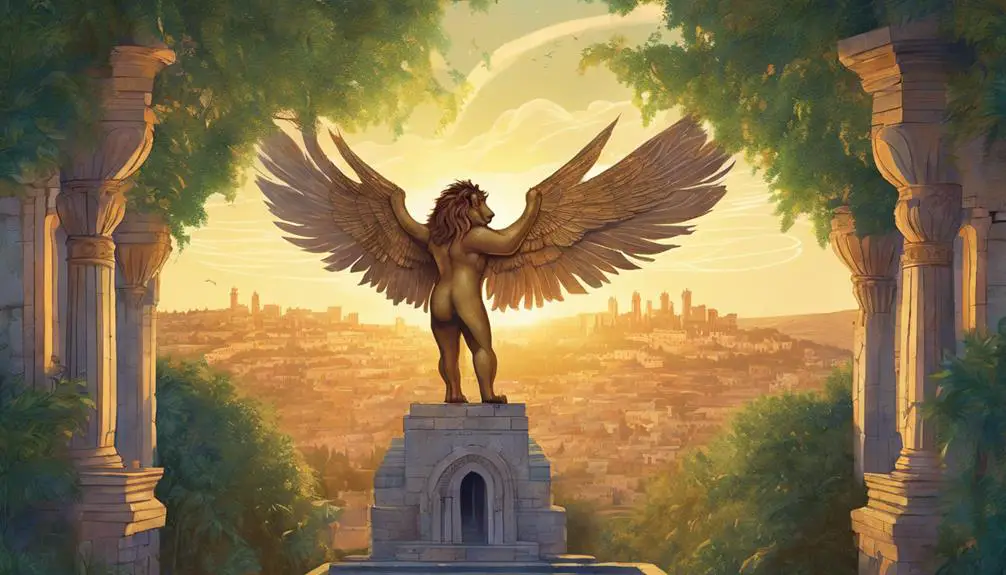Yellowing scrolls unveil the enigmatic Ariel, a biblical name shrouded in mystery, awaiting discovery in the ancient texts of Isaiah's prophecies.

Who Is Ariel in the Bible
As you explore the Bible, you'll discover Ariel, a name that embodies strength, courage, and divine connection. Derived from Hebrew, Ariel symbolizes the complexities of Jerusalem, a city whose history and spiritual significance are deeply intertwined. In Isaiah's prophecy, Ariel represents Jerusalem, weaving themes of judgment and redemption. But there's more to unravel – the Lion of God, the Temple Altar, and the metaphor for Jerusalem itself. As you dig deeper, you'll uncover the rich tapestry of Ariel's symbolism, and the mysteries that lie beneath its sacred and fortified stronghold.
The Meaning of Ariel in Hebrew

In Hebrew, the name Ariel is derived from the words 'ari' meaning lion and 'el' meaning God, thereby yielding the profound meaning 'lion of God' or 'altar of God'.
As you explore the Hebrew etymology of Ariel, you'll uncover a rich tapestry of ancient script and linguistic nuances. The word 'ari' is often associated with strength, courage, and majesty, which are all embodied in the majestic lion. Meanwhile, 'el' is a symbol commonly used to denote a connection to the divine.
When combined, these two words create a powerful symbol that resonates deeply with the Israelites' conception of God. In the ancient script, the Hebrew characters that form Ariel's name (אריאל) are an illustration of the linguistic intricacies of the language.
As you explore the meaning of Ariel in Hebrew, you begin to appreciate the complexity and beauty of the language. The name Ariel is more than just a label; it's a window into the cultural, historical, and spiritual context of the Israelites.
Isaiah's Use of Ariel in Prophecy

As you explore the book of Isaiah, you'll discover that the prophet employs Ariel as a symbolic name for Jerusalem, weaving a rich tapestry of prophecy that foretells the city's future.
In Isaiah 29:1-7, Ariel is used to describe Jerusalem as a city of joy, but one that will soon be besieged by enemy forces. This prophetic foreshadowing sets the stage for the apocalyptic imagery that follows, depicting a city in ruin and its people in despair.
However, Isaiah's prophecy also holds out hope for Jerusalem's restoration, hinting at a future redemption that will bring joy and prosperity back to the city. Through Ariel, Isaiah masterfully weaves together themes of judgment and redemption, painting a vivid picture of Jerusalem's tumultuous history and its ultimate redemption.
As you explore further into Isaiah's prophecy, you'll uncover a complex and nuanced portrait of Ariel, a city that embodies both the darkness of human sin and the radiant hope of divine redemption.
Symbolism Behind the Lion of God

You'll notice that the Lion of God, a symbolic representation of Ariel, embodies the dual nature of Jerusalem, conveying both ferocity and gentleness, as it personifies the city's tumultuous history and its ultimate redemption.
This symbolic representation is rooted in the Hebrew Bible, where the lion is often associated with Divine Strength and Regal Authority. As you explore further into the symbolism, you'll discover that the lion's ferocity represents God's judgment and wrath, while its gentleness symbolizes God's mercy and compassion.
The Lion of God, Ariel, embodies the paradoxical nature of Jerusalem, a city that has experienced both destruction and restoration. This duality is reflective of the city's complex history, marked by periods of turmoil and tranquility.
The Connection to the Temple Altar

Ariel's connection to the Temple Altar is rooted in the Hebrew Bible, where the altar's design and rituals symbolize the city's sacred purpose as a nexus of divine worship and sacrifice. You'll notice that the Temple Altar is a central component of Israel's religious practices, facilitating daily altar sacrifices and temple worship. As Ariel, the Lion of God, is associated with the city of Jerusalem, it's evident that the altar's significance extends to Ariel's role as a guardian of the sacred space.
The ritualistic practices surrounding the altar, such as the offering of animal sacrifices, underscore the importance of atonement and forgiveness in the Israelites' relationship with God.
As you explore further into Ariel's connection to the Temple Altar, you'll discover that the altar's design, with its horns and ledges, symbolizes the city's role as a mediator between the divine and human worlds. The altar's presence also highlights the significance of temple worship, emphasizing the importance of communal religious practices in ancient Israelite society.
Ariel as a Metaphor for Jerusalem

Jerusalem's embodiment as Ariel, the Lion of God, serves as a potent metaphor, underscoring the city's status as a sacred, fortified stronghold, where the divine and human domains intersect.
As you explore the symbolism, you'll find that Ariel represents the essence of Jerusalem as a Holy City, where God's presence is palpable. This metaphor highlights the city's unique position as a place of Divine Protection, where the faithful can seek refuge and solace.
The Lion of God moniker also conveys the idea of Jerusalem as a stronghold, protected by God's power and might. This notion is reinforced by the prophet Isaiah, who emphasizes God's promise to defend and deliver the city from harm.
As you ponder Ariel as a metaphor for Jerusalem, you'll come to appreciate the depth of meaning behind this symbolic representation, which underscores the city's significance as a sacred, fortified, and divinely protected stronghold.
Unraveling the Mystery of Ariel

As you explore the biblical narrative, the enigmatic figure of Ariel emerges, shrouded in mystery, awaiting deciphering. You're likely to find yourself entangled in a web of interpretations, with Ariel's true nature and purpose remaining elusive.
Yet, as you investigate further, a fascinating portrait begins to take shape. In Isaiah 29:1, Ariel is referred to as the 'altar hearth' or 'lion of God,' sparking debate among scholars. Some propose that Ariel serves as a divine messenger, conveying God's message to the people of Jerusalem. Others argue that Ariel embodies ancient wisdom, representing the collective knowledge and spiritual heritage of the Israelites.
As you navigate the complexities surrounding Ariel, you'll encounter a rich tapestry of symbolism and metaphor. Unraveling the mystery of Ariel requires a nuanced understanding of biblical language, cultural context, and historical significance. By examining the scriptural references and allusions, you'll uncover a multifaceted figure that embodies the intersection of human and divine.
As you continue to explore the enigma of Ariel, you'll gain a deeper appreciation for the intricacies of biblical narrative and the ancient wisdom it conveys.
Conclusion
As you explore further into the mysteries of Ariel, you unravel the threads of prophecy, symbolism, and metaphor.
You discover that Ariel represents both the Lion of God and the Temple Altar, embodying the sacred and the powerful.
Through Isaiah's prophecy, you uncover the connection to Jerusalem, the city of God.
Like a master weaver, the Bible intertwines the threads of meaning, revealing Ariel as a powerful symbol of God's presence and power, a proof to the intricacies of divine design.



Sign up